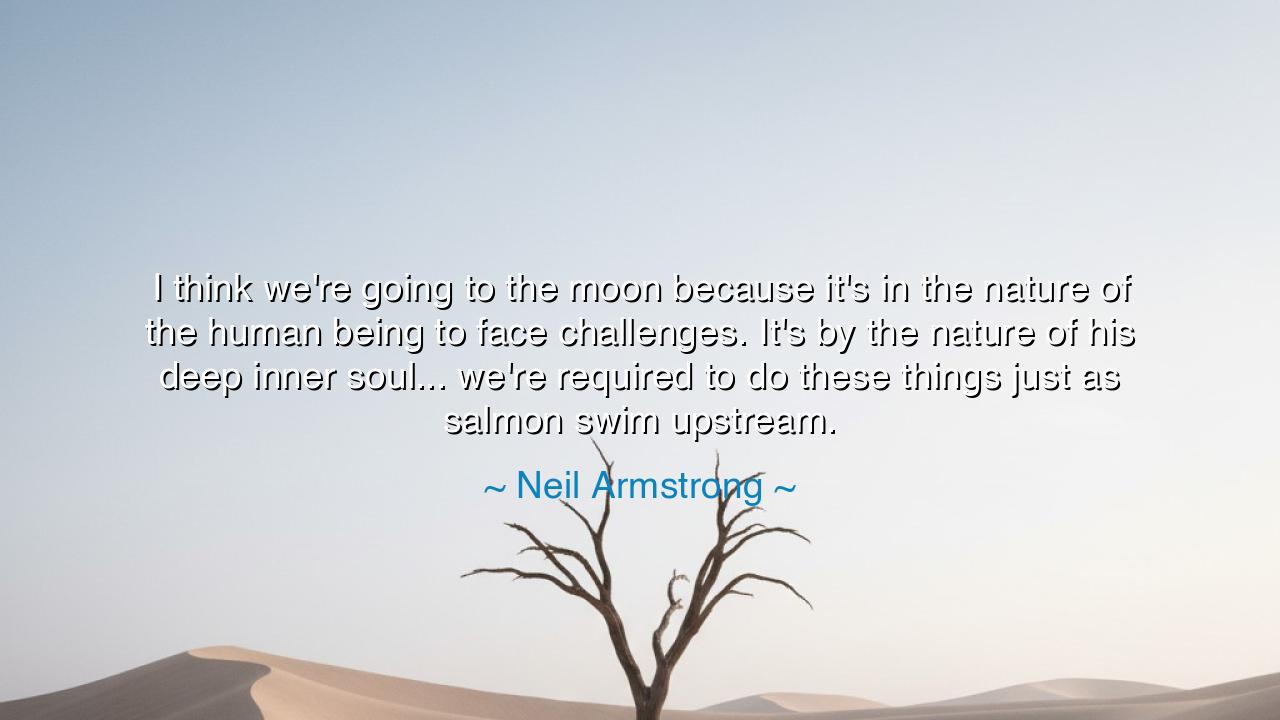
I think we're going to the moon because it's in the nature of the
I think we're going to the moon because it's in the nature of the human being to face challenges. It's by the nature of his deep inner soul... we're required to do these things just as salmon swim upstream.






In the annals of human history, there are few moments that embody the spirit of adventure and the pursuit of the unknown like the Apollo 11 mission. When Neil Armstrong set foot upon the moon, he did not just step onto the surface of a distant celestial body; he stepped into the deepest, most primal instinct of humanity—the drive to conquer, to explore, and to challenge the boundaries of what is possible. In his words, “I think we're going to the moon because it’s in the nature of the human being to face challenges. It's by the nature of his deep inner soul... we’re required to do these things just as salmon swim upstream.” With these words, Armstrong tapped into a truth as old as time itself: humanity, in its deepest essence, is driven not by necessity, but by a calling to push forward, to rise against the current, and to meet challenges with the same fierce determination as the salmon who swim upstream.
In the ancient world, the heroes and gods were defined by their struggles. Heracles, with his twelve labors, was not celebrated for taking the easy path, but for confronting impossible odds, overcoming tasks that others deemed insurmountable. Similarly, Odysseus, the great hero of Homer’s epic, did not seek to return home through a simple journey but was cast into a storm of trials, each one testing his wits, his will, and his strength. The ancient peoples understood that challenges are not obstacles to avoid, but rites of passage that define the human spirit. Just as Odysseus fought the winds of fate, so too did Armstrong and his fellow astronauts set out into the void of space, driven by an inner urge to challenge the unknown and, in doing so, define humanity's place in the cosmos.
The metaphor that Armstrong uses—the salmon swimming upstream—is a powerful one. It is a reminder that nature itself is filled with examples of struggle and resilience. Every year, the salmon, with its deep instinctual drive, swims upstream against the fierce current, to return to the place of its birth. This journey is fraught with dangers: obstacles, predators, and the overwhelming force of the water itself. Yet, despite the odds, the salmon presses forward, driven by a force deeper than understanding, a calling that is not learned, but innate. So too, do human beings rise to the challenges before them. The moon, once a distant and impossible dream, became a symbol of that unyielding drive, that instinct to face the impossible, to swim against the current of what is believed to be possible, and to push the boundaries of what we can achieve.
History is full of such examples of humanity’s drive to overcome. The explorers of the Age of Discovery, like Columbus and Magellan, ventured into uncharted waters, driven not by a need for survival, but by an unquenchable thirst for knowledge and discovery. They faced storms, mutiny, and the unknown, yet they pressed on because they understood that the greatest reward comes not from avoiding the struggle, but from embracing it. In their quests, they, too, swam upstream, against the current of fear and doubt. And when they reached their destinations, they did not just find new lands—they discovered new realms of the human spirit, new heights of what could be achieved when one dares to face the impossible.
Similarly, the moon landing was not merely a technological achievement, but a testament to humanity's spirit of resilience and curiosity. Armstrong and his fellow astronauts did not land on the moon because they were forced to, but because there was a deep, unshakable drive within them to do so. Space was not a territory to be claimed for domination, but a challenge to be faced for the sake of knowledge, for the sake of proving that human beings are capable of reaching beyond the limits of their world. The mission was an embodiment of that timeless truth: that it is in the face of the greatest challenges that the human spirit shines brightest.
The lesson, then, is clear: in life, we are often called to face challenges that seem impossible. Whether in our personal lives, in our work, or in the pursuit of our dreams, the path forward is not always smooth or easy. Yet, it is through these very challenges that we grow. Like the salmon, like Heracles and Odysseus, we are not made stronger by avoiding the difficult currents of life, but by swimming against them, by embracing the struggle and rising above it. In our own way, we too must face the upstream currents that seek to hold us back. These struggles are not punishments—they are the very means by which we achieve greatness.
So, let us take Armstrong’s words to heart. Let us remember that it is in the nature of the human spirit to embrace challenges, not to shy away from them. Let us approach the obstacles in our lives with the same courage, resilience, and vision that he and his fellow astronauts demonstrated when they set foot on the moon. In doing so, we will not only find success, but we will define our humanity, showing that it is not the size of the challenge that matters, but the strength of the spirit that dares to face it.






AAdministratorAdministrator
Welcome, honored guests. Please leave a comment, we will respond soon